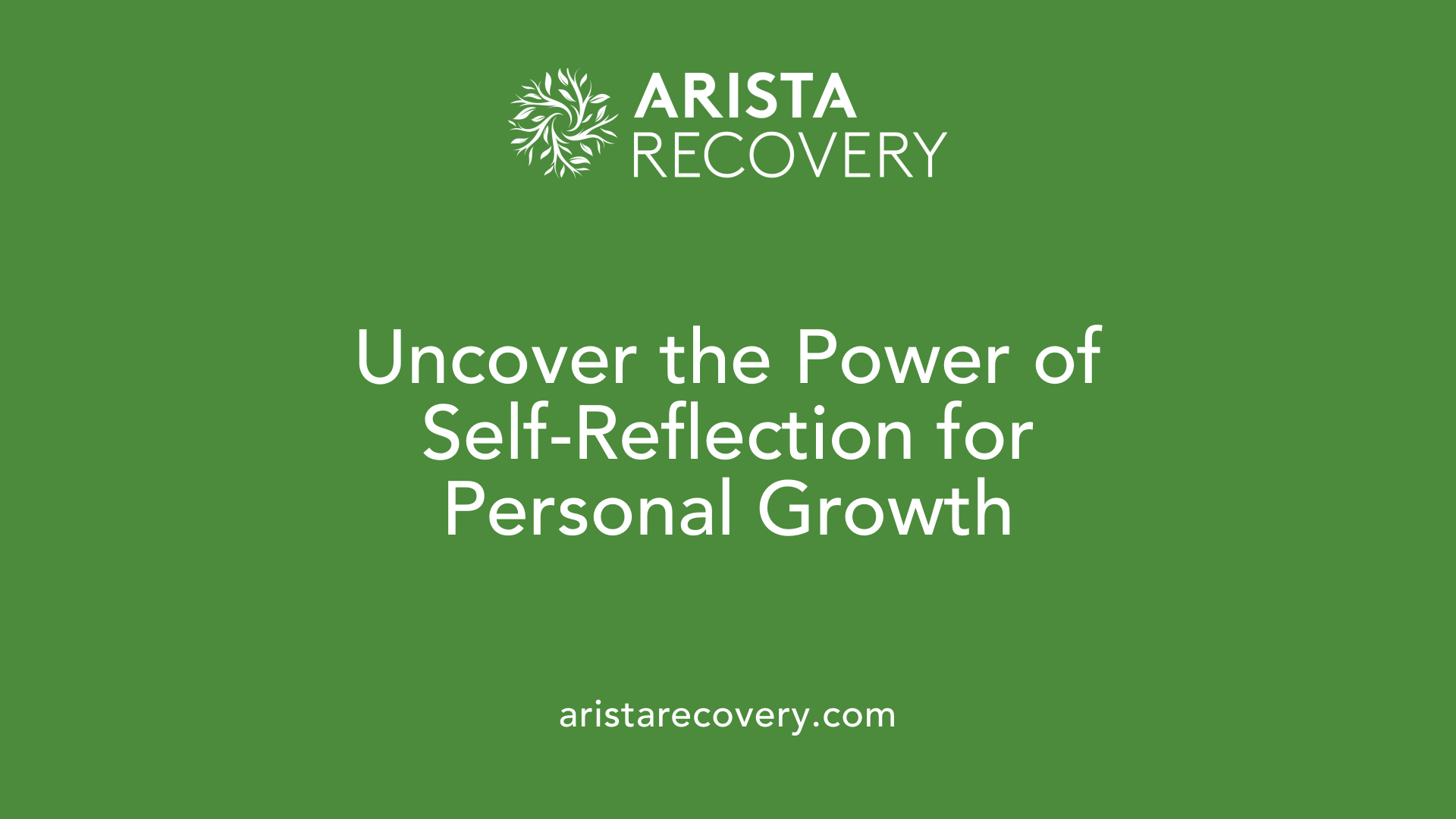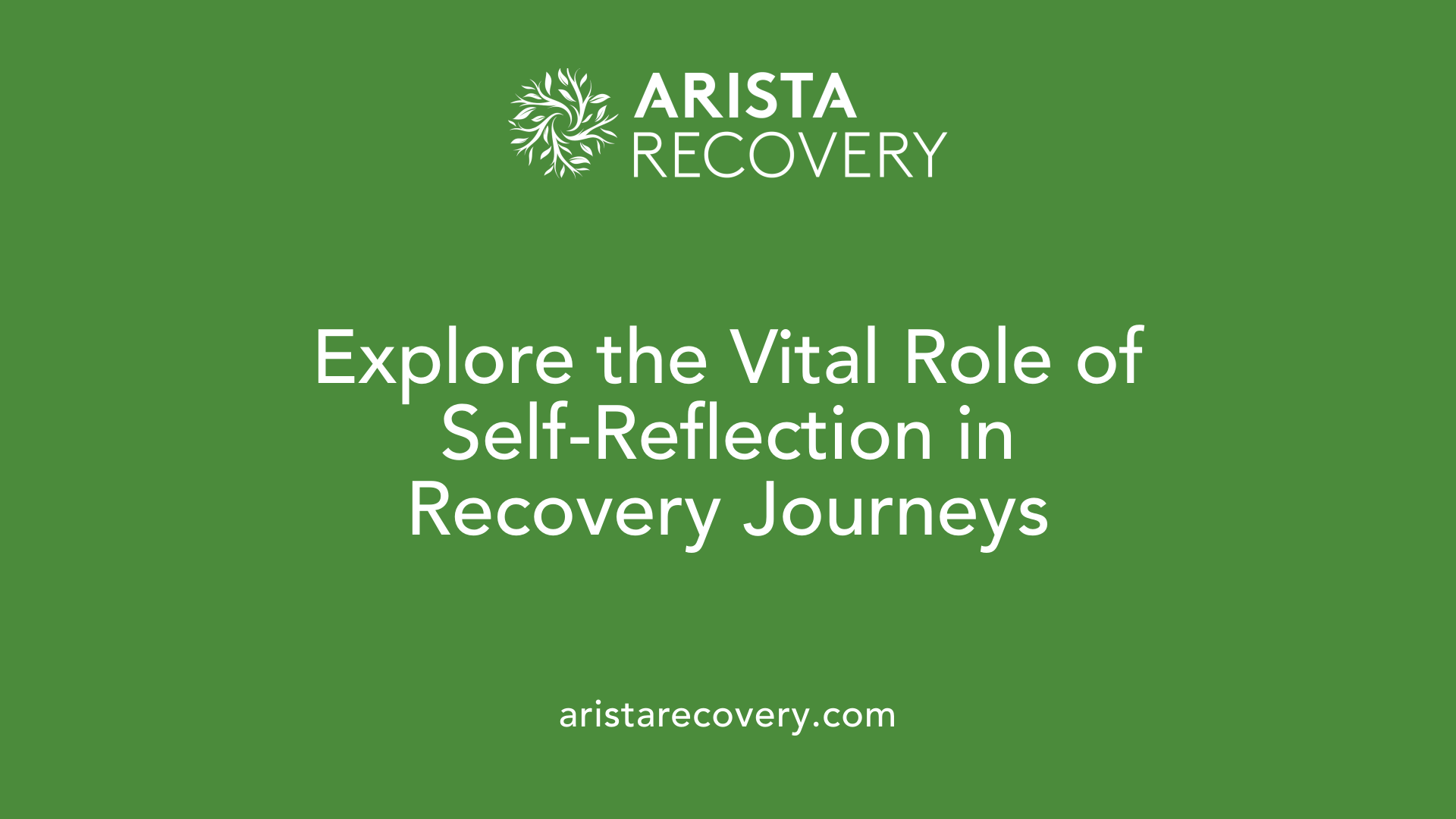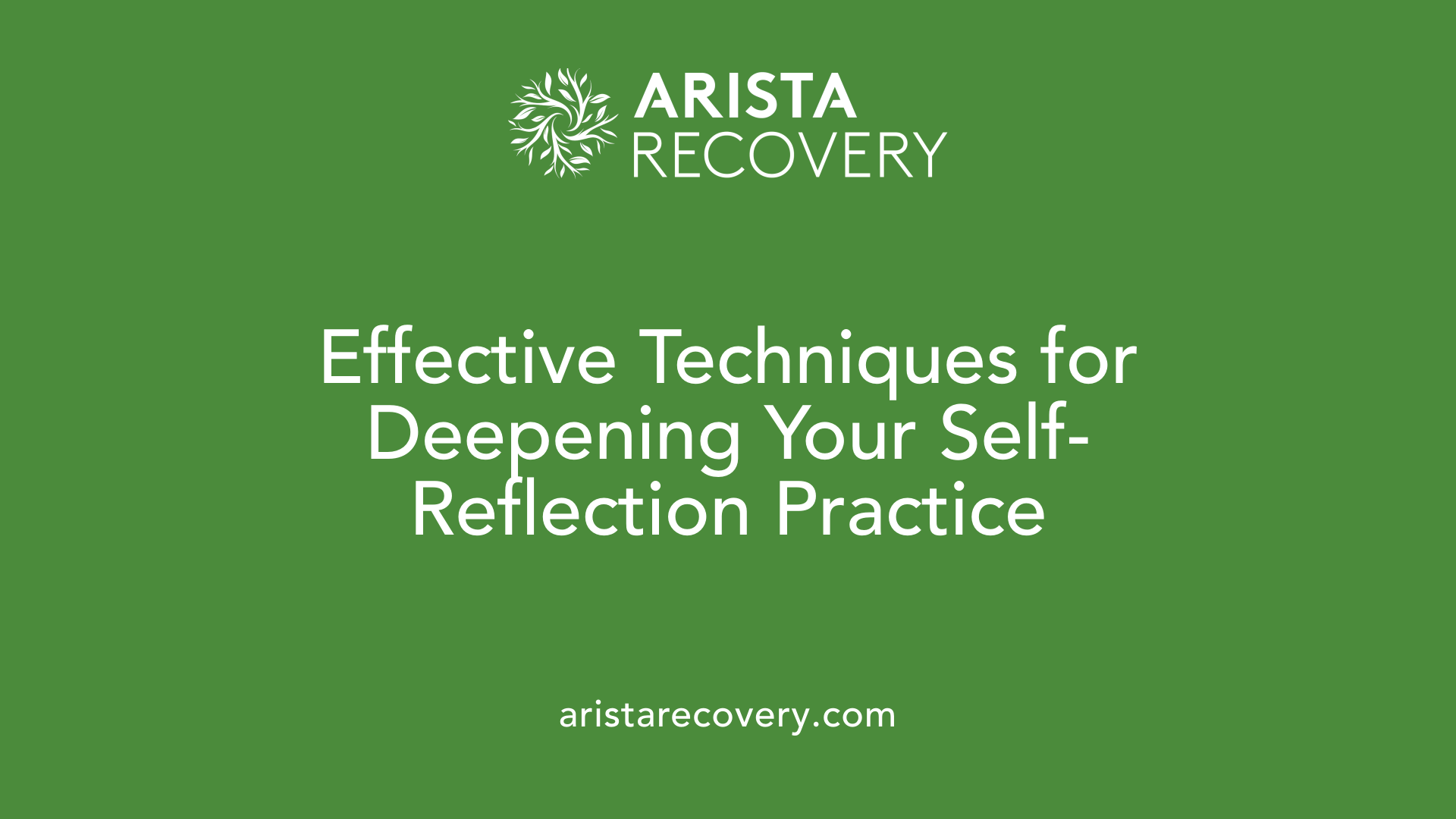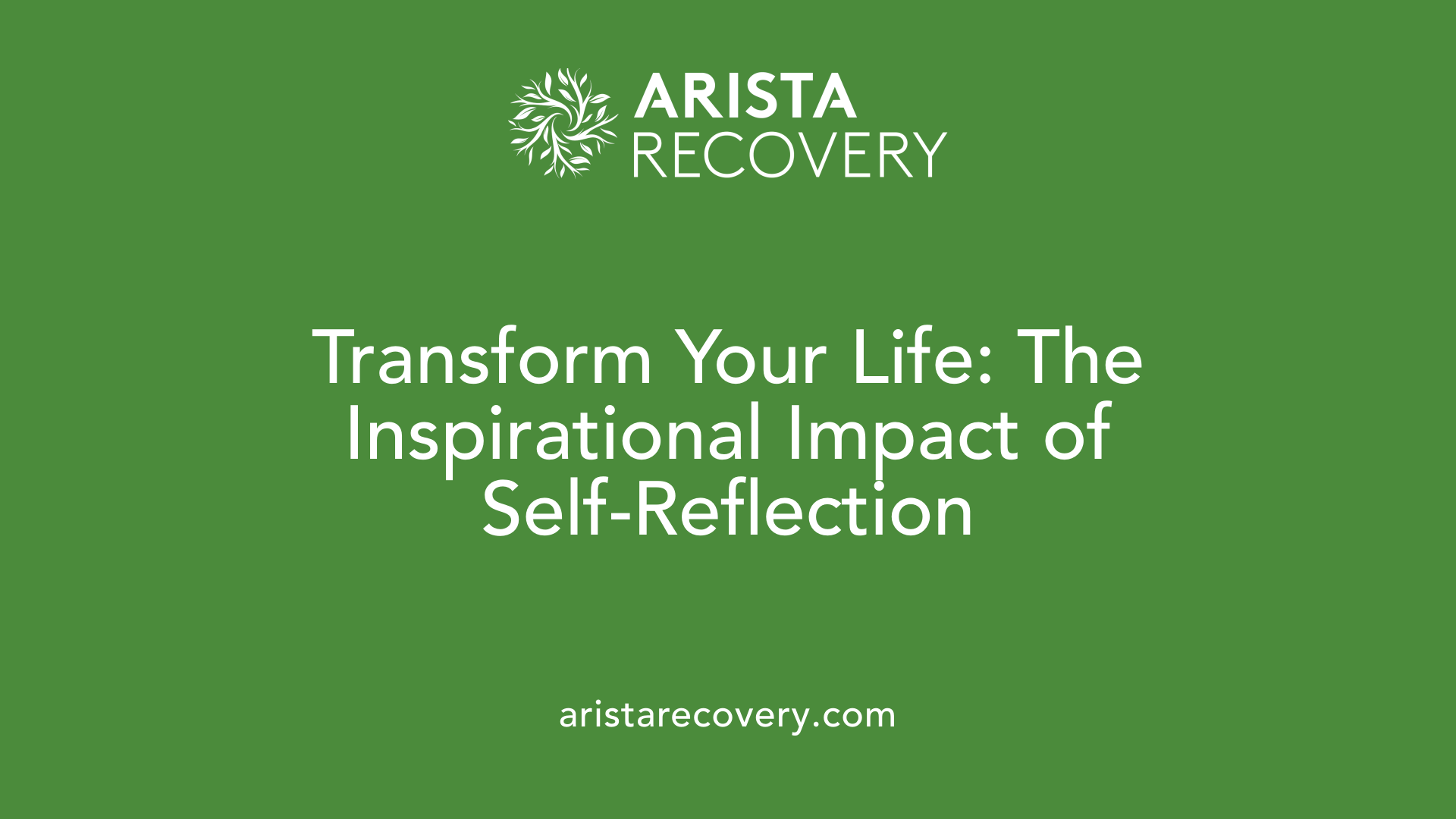The Role of Self-Reflection in Personal Growth During Recovery

Introduction
Self-reflection plays a pivotal role in personal growth, particularly during recovery from challenges such as addiction and eating disorders. This introspective process allows individuals to gain profound insights into their thoughts, emotions, and behaviors, leading to a deeper understanding of themselves and fostering substantial personal development. In this journey of recovery, self-reflection acts as a mirror, revealing hidden truths and promoting essential changes vital for healing and growth.
Understanding Self-Reflection: A Pathway to Self-Awareness

Definition and process of self-reflection
Self-reflection is a conscious practice that involves examining one’s thoughts, emotions, and actions. It requires individuals to pause and inwardly assess their feelings and motivations, fostering a clearer understanding of their behaviors. This personal exploration can take different forms, such as journaling, mindfulness meditation, or engaging in open dialogues with trusted individuals.
Role in enhancing self-awareness
Self-reflection is a powerful tool for enhancing self-awareness. By reflecting on personal experiences, people can identify areas needing improvement and recognize emotional triggers that affect their lives. This cultivated awareness allows for the development of emotional intelligence, which is essential for managing feelings and improving interpersonal relationships. The act of looking inward promotes resilience, enabling individuals to confront challenges with a more proactive mindset.
Impact on personal growth
Self-reflection benefits personal growth and development by providing individuals with insights into their strengths, weaknesses, and behavioral patterns, which aid in effective goal setting. Through self-awareness, individuals can establish clear and actionable personal development goals that align with their intrinsic values, enhancing motivation and focus. This process encourages a growth mindset, allowing individuals to view challenges as opportunities for growth, thereby fostering resilience and adaptability. Incorporating mindfulness and cognitive restructuring into self-reflection practices can further improve emotional wellbeing and reduce stress. Ultimately, self-reflection empowers individuals to create a personal development plan that directs their efforts towards achieving a fulfilling and meaningful life.
Self-Reflection in Recovery: A Crucial Component

Why is self-reflection significant in recovery journeys?
Self-reflection plays a vital role in recovery journeys by facilitating a deeper understanding of oneself. It allows individuals to gain insights into their behaviors and recognize the underlying causes of their challenges. By examining their thoughts, emotions, and actions, individuals can identify stressors and triggers that may contribute to their addictions or disordered behaviors.
This introspective process fosters self-awareness, empowering individuals to confront issues they might have previously suppressed. Not only does this enhance emotional intelligence, leading to improved relationships and decision-making, but it also cultivates personal growth. Individuals learn to transform past mistakes into opportunities for resilience and strength.
Additionally, self-reflection helps individuals reassess their values and motivations. It encourages them to align their behaviors with their aspirations, paving the way for meaningful goal setting. \
Benefits of Self-ReflectionDescriptionImpact on RecoveryIncreased Self-AwarenessUnderstanding behaviors and triggersLeads to informed decision-makingPromotes Emotional RegulationIdentifying emotional responsesEnhances interpersonal relationshipsFacilitates Personal GrowthLearning from past experiencesBuilds resilience and adaptabilityAligns Actions with ValuesCultivating authenticityStrengthens commitment to recoveryImproves Coping StrategiesRecognizing detrimental patternsSupports long-term sobriety
In summary, self-reflection is a cornerstone of effective recovery, providing individuals with the insights needed to navigate their journey and achieve lasting change.
Techniques to Foster Effective Self-Reflection During Recovery

What techniques can be used for effective self-reflection?
Effective self-reflection techniques play a vital role in the recovery journey. One powerful method is journaling, where individuals document their thoughts and feelings. This practice not only provides an outlet for emotions but also helps recognize patterns in behavior and emotional responses. By regularly writing, individuals can track their progress and identify triggers.
Incorporating mindfulness practices, such as meditation, can also enhance self-reflection. Engaging in meditation helps clear the mind, facilitating deeper introspection and creative thinking. Taking mindful walks in nature can promote present-moment awareness and encourage reflective thinking as well.
Setting structured reflection routines can further amplify the self-reflection process. Creating specific times during the day for reflection ensures consistency. For example, individuals can use guided journals that include open-ended questions about personal goals and achievements, prompting systematic exploration of their experiences.
Additionally, discussing reflections with a trusted friend or therapist can offer fresh perspectives and facilitate deeper understanding. These conversations often provide accountability and encourage individuals to confront uncomfortable truths.
Overall, setting the right environment, asking deeper questions, and employing these techniques can lead to meaningful personal growth during recovery.
Enhancing Emotional Intelligence Through Self-Reflection
How does self-reflection enhance emotional intelligence?
Self-reflection enhances emotional intelligence by enabling individuals to gain deeper insights into their emotional responses and triggers, leading to better self-awareness. By regularly assessing thoughts and feelings, individuals can identify patterns in their behavior and how these affect their interactions with others. This understanding plays a crucial role in developing empathy, as reflecting on one’s experiences helps appreciate the perspectives of others.
Developing better self-awareness
Self-awareness is foundational to emotional intelligence. Engaging in self-reflection allows individuals to recognize strengths and weaknesses, fostering an environment for personal growth. Techniques like journaling and mindfulness practices can assist in cultivating this self-awareness.
Understanding emotional triggers
Identifying emotional triggers is another benefit of self-reflection. By analyzing past experiences, individuals can pinpoint situations that elicit strong emotional reactions. This knowledge helps in developing coping strategies, leading to improved emotional regulation during challenging moments.
Impact on interpersonal relationships
When individuals engage in self-reflection, they learn to navigate their emotions more effectively. This capability results in healthier interpersonal relationships. By understanding their emotional responses and recognizing the impact on others, individuals can communicate more constructively and build stronger connections.
AspectBenefitTechniqueSelf-AwarenessRecognize strengths and weaknessesJournaling, MindfulnessUnderstanding TriggersDevelop coping strategiesPattern AnalysisInterpersonal RelationshipsImproved communicationReflective Practices
Setting and Achieving Personal Goals with Self-Reflection

How does self-reflection aid in setting and achieving personal goals?
Self-reflection is a fundamental practice that enhances personal growth by helping individuals align their goals with their core values and aspirations. This introspective process encourages individuals to evaluate their thoughts, emotions, and behaviors, shedding light on what truly matters to them. By recognizing their intrinsic motivations, individuals can set goals that resonate with their authentic selves, leading to greater satisfaction and fulfillment.
Aligning goals with values
When individuals take time to reflect on their experiences and beliefs, they can identify the values that shape their lives. Aligning personal goals with these values ensures that individuals are not only setting targets but are also committed to achieving outcomes that truly reflect their desired path. This alignment fosters a sense of purpose and direction.
Developing strategies for improvement
Self-reflection also assists in recognizing areas for improvement. By analyzing past experiences and outcomes, individuals can discern their strengths and weaknesses. This understanding allows for the creation of targeted strategies to address challenges and optimize growth. For instance, someone reflecting on their past decisions can develop actionable plans that set them up for success in future endeavors.
Fostering motivation and commitment
Moreover, the process of introspection promotes resilience. As individuals confront their setbacks and mistakes through self-reflection, they cultivate a mindset that embraces learning and growth. This nurtures motivation and commitment to their goals, as they become empowered to overcome obstacles and pursue their aspirations with clarity. Self-reflection serves as a powerful tool in navigating the complexities of personal growth and achieving long-term success, ultimately transforming goals into tangible accomplishments.
The Role of Introspection in Emotional Healing and Awareness
What is the role of introspection in emotional healing and self-awareness?
Introspection plays a vital role in emotional healing and self-awareness by enabling individuals to examine their thoughts, feelings, and behaviors. This self-reflection fosters a deeper understanding of emotional triggers and destructive patterns, which is essential for developing healthier coping mechanisms.
By facing and acknowledging emotions—the good and the uncomfortable—individuals can move forward in their healing journey. Engaging in practices like journaling and mindfulness not only helps in emotional recognition but also aids in developing resilience against future challenges.
Understanding and acknowledging emotions
Through introspection, individuals learn to identify their emotions, which is critical in addressing personal challenges. This process involves recognizing feelings of guilt, anxiety, or sadness, allowing for a proper assessment of their impact on well-being.
Developing healthier coping mechanisms
By analyzing past behaviors and emotional responses, individuals can pinpoint triggers that lead to negative coping strategies. This insight is crucial for replacing harmful habits with healthier ones, promoting recovery and emotional stability.
Promoting resilience and personal growth
Ultimately, introspection fosters personal growth by encouraging individuals to learn from their experiences. It builds emotional resilience, allowing them to face future adversities with a renewed sense of strength and understanding.
In summary, introspection is not just about self-examination—it's about building a path toward emotional healing and growth, facilitating better relationships and overall well-being.
Long-term Implications of Self-Reflection for Development and Regulation
What are the long-term implications of self-reflection for personal development and emotional regulation?
Self-reflection has profound long-term implications for personal growth and emotional regulation. At its core, self-reflection enhances self-awareness, allowing individuals to better understand their thoughts, feelings, and actions. This deeper understanding fosters emotional intelligence, equipping people with the skills to manage their emotions effectively and nurture healthier relationships.
Improving emotional intelligence
By regularly engaging in self-reflection, individuals learn to identify and process their emotions, leading to improved emotional responses in various situations. This growth in emotional intelligence becomes crucial in interpersonal interactions, paving the way for enhanced empathy and conflict resolution skills.
Aligning goals with core values
Another significant benefit of self-reflection is the ability to align one’s goals with core values. When individuals reflect on their true aspirations, they can make more intentional decisions that resonate with their fundamental beliefs. This alignment fosters a deeper sense of fulfillment in personal and professional life, as actions become more meaningful and congruent with one's identity.
Promoting continuous learning and adaptation
Furthermore, self-reflection encourages continuous learning and adaptation. By examining past choices and experiences, individuals turn mistakes into opportunities for growth. This proactive approach not only builds resilience but also cultivates a mindset of lifelong learning, crucial for navigating life's challenges.
In summary, the long-term implications of self-reflection on personal development and emotional regulation are transformative, enhancing emotional intelligence, aligning goals with core values, and fostering a culture of continuous learning.
Practical Strategies for Self-Reflection Integration in Daily Life
Creating a Schedule for Reflection
Establishing a regular schedule for self-reflection can significantly enhance personal growth. Designate specific times during the day or week for self-reflection, whether it’s in the morning with a cup of coffee or before bedtime. Setting reminders on your phone can help maintain consistency in this practice.
Incorporating Mindfulness
Mindfulness practices, such as meditation or deep breathing exercises, can enrich self-reflection. Taking a few moments to focus on the present can help clear your mind, making it easier to evaluate your thoughts and emotions. Techniques like gratitude journaling can also cultivate a more positive mindset by helping individuals appreciate their progress and identify areas for growth.
Seeking Professional Guidance
Engaging with a therapist or counselor can provide valuable insights during the self-reflection process. They can facilitate deeper introspection by helping individuals address underlying issues, set realistic goals, and develop effective coping strategies. This professional support creates a safe space for exploring emotions and enhancing self-awareness, enriching the recovery journey.
Self-Reflection in Addiction Recovery Programs: Steps 4 and 10 of AA
Role of Self-Reflection in 12-Step Programs
Self-reflection is a cornerstone of the 12-step process, especially in Step 4 of Alcoholics Anonymous (AA). Here, individuals are encouraged to conduct a fearless moral inventory of themselves. This deep introspection aids in recognizing past mistakes and behaviors that contribute to addiction. By engaging in this self-exploration, individuals gain crucial insights into the emotional triggers and patterns that led to substance use.
Confronting Past Behaviors
Confronting uncomfortable memories and behaviors during self-reflection is vital for personal healing. In this process, individuals are prompted to face the reality of their actions without self-judgment. This honest confrontation not only fosters accountability but also supports the development of resilience, as acknowledging past mistakes allows for genuine learning and growth.
Maintaining Ongoing Accountability
The 10th Step of AA emphasizes continuous self-reflection and accountability, promoting daily evaluations of thoughts and actions. By creating a routine for self-assessment, individuals can maintain awareness of their recovery journey, fostering emotional stability and reducing the risk of relapse. This consistent effort ultimately strengthens their commitment to sobriety and personal growth.
Creating Supportive Environments for Self-Reflection
Importance of Community Support
A supportive community is vital for individuals on their recovery journey. Engaging with others who share similar experiences fosters an environment where self-reflection can thrive. Positive influences can enhance motivation, promote accountability, and provide crucial guidance during challenging times.
Therapeutic Settings
Therapeutic environments encourage self-reflection by providing safe spaces for clients to express thoughts and feelings. In these settings, individuals can confront their emotions without fear of judgment, enhancing emotional healing and insights. Techniques such as group therapy can also facilitate collective self-reflection, promoting shared learning and growth.
Reducing Stigma Around Mental Health
Addressing societal stigmas surrounding addiction and mental health is essential for fostering openness in self-reflection practices. Cultivating a culture that values honesty and vulnerability encourages individuals to engage in self-reflection without fear of being judged. This shift not only supports personal growth but also contributes to the effectiveness of recovery programs.
AspectDescriptionBenefitsCommunity SupportEngaging with others who understand the journeyEnhanced motivation and accountabilityTherapeutic SettingsSafe spaces for expression and introspectionEmotional healing and personal insightsReducing StigmaPromoting openness about mental health and addictionEnables self-reflection without fear
Creating these supportive environments ultimately paves the way for deeper self-awareness and personal growth in recovery.
Inspiration and Transformation Through Self-Reflection

Transitioning from Past Challenges
Self-reflection creates a powerful opportunity for individuals to examine their past challenges deeply. By acknowledging mistakes and emotions, individuals can understand the factors that contributed to their struggles. This insight is essential for personal development, as it empowers individuals to identify patterns in their behavior and avoid repeating past missteps. The process of reflecting on adversities helps cultivate resilience, transforming what once felt devastating into powerful learning experiences.
Motivating Change and Transformation
The practice of self-reflection serves as a motivator for development and change. By recognizing their strengths and weaknesses, individuals can set specific, meaningful goals aligned with their core values. Engaging in techniques like journaling and mindfulness allows for a clearer comprehension of motivations, facilitating an authentic commitment to personal growth. This structured approach encourages taking proactive steps toward positive changes in behaviors and overall life direction.
Reinventing Personal Identity
As individuals navigate their recovery journey, self-reflection plays a critical role in reinventing personal identity. It fosters a deeper understanding of oneself, clarifying values and beliefs. This introspection helps individuals to let go of unhelpful beliefs and embrace new identities that promote emotional health and well-being. Ultimately, through the continuous journey of self-discovery, individuals can reconnect with their true selves and build lives filled with purpose and meaning.
Conclusion
The journey of recovery emphasizes the need for self-reflection as a crucial element of personal growth. This introspective practice not only fosters awareness and emotional intelligence but also empowers individuals to confront their past, understand their motivations, and set meaningful goals. By incorporating self-reflection into recovery, individuals can gain valuable insights, enhance their well-being, and build a solid foundation for a fulfilling, meaningful life. As recovery continues to be a lifelong journey, self-reflection remains an indispensable tool for navigating personal challenges and achieving long-term success.
References
- The Role of Self-Reflection in Personal Growth
- Discovering the Power of Self-Reflection for Addiction Recovery
- The Importance of Self-Reflection in Recovery
- The Importance of Self-Reflection in Recovery - Waves of Hope
- The Importance of Self-Reflection in Personal Growth - Manochikitsa
- Step 4 of AA: Embracing Self-Reflection for Growth
- Why Self-Reflection is Important in Addiction Recovery
- The 10th Step AA | A Guide To Self Reflection and Growth
- The Role of Self-Reflection in Personal Growth - life coach certification
When mental health challenges and addiction intersect, it can feel isolating. At Arista, we offer compassionate, evidence-based, and trauma-informed care to help you heal, grow, and move forward.
You’re not alone in this.
When mental health challenges and addiction intersect, it can feel isolating. At Arista, we offer compassionate, evidence-based, and trauma-informed care to help you heal, grow, and move forward.
Support that moves with you.
You’ve taken a brave first step. At Arista Recovery, we’re here to help you continue with best-in-class care designed for long-term healing and support.
.webp)






